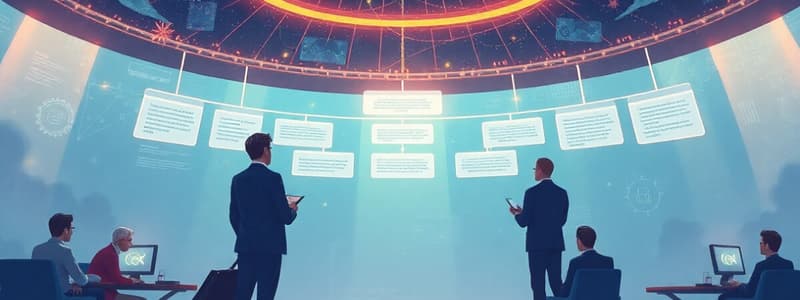Podcast
Questions and Answers
What must be ensured regarding authority and responsibility in an organization?
What must be ensured regarding authority and responsibility in an organization?
- Responsibility can be delegated to others.
- Responsibility is optional for managers.
- Authority and responsibility must be coexistent. (correct)
- Authority must exist without responsibility.
What does the principle of 'unity of direction' ensure in an organization?
What does the principle of 'unity of direction' ensure in an organization?
- All activities must align towards one objective and one plan. (correct)
- Each department operates independently without coordination.
- Multiple objectives can be pursued simultaneously.
- Changes in activities do not require a unified approach.
Which principle emphasizes the need for an organization to be adaptable to changes?
Which principle emphasizes the need for an organization to be adaptable to changes?
- Balance
- Simplicity
- Flexibility (correct)
- Efficiency
Which of the following is a key factor in the communication process within an organization?
Which of the following is a key factor in the communication process within an organization?
What is suggested about the number of levels in an organizational structure?
What is suggested about the number of levels in an organizational structure?
In the context of organizational size, what does stability refer to?
In the context of organizational size, what does stability refer to?
Which type of organization structure is characterized by a clear line of authority and command?
Which type of organization structure is characterized by a clear line of authority and command?
Which principle allows an organization to use human resources optimally?
Which principle allows an organization to use human resources optimally?
What is the principle of unity of command primarily aimed at preventing?
What is the principle of unity of command primarily aimed at preventing?
Which of the following statements best describes the subordination of individual interest to general interest?
Which of the following statements best describes the subordination of individual interest to general interest?
In a decentralized organization, who holds the decision-making authority?
In a decentralized organization, who holds the decision-making authority?
What is the scalar chain in an organizational context?
What is the scalar chain in an organizational context?
Which principle suggests that discipline requires both good superiors and fair agreements?
Which principle suggests that discipline requires both good superiors and fair agreements?
How does Fayol suggest an organization determine the balance between centralization and decentralization?
How does Fayol suggest an organization determine the balance between centralization and decentralization?
Which principle encourages managers to treat employees with fairness and justice?
Which principle encourages managers to treat employees with fairness and justice?
What must the remuneration of personnel ensure according to management principles?
What must the remuneration of personnel ensure according to management principles?
What does the principle of Order emphasize in an organization?
What does the principle of Order emphasize in an organization?
Which principle highlights the need for one head and one plan for groups with the same objective?
Which principle highlights the need for one head and one plan for groups with the same objective?
What is a potential consequence of instability in an organization according to the principles discussed?
What is a potential consequence of instability in an organization according to the principles discussed?
How does encouraging initiative among employees benefit an organization?
How does encouraging initiative among employees benefit an organization?
What is the primary focus of the principle of Esprit de corps?
What is the primary focus of the principle of Esprit de corps?
Which of the following best describes the concept of 'Levels of Management'?
Which of the following best describes the concept of 'Levels of Management'?
What effect does a large number of levels in management have on communication within an organization?
What effect does a large number of levels in management have on communication within an organization?
What does delegation of authority primarily involve?
What does delegation of authority primarily involve?
Study Notes
Principles of Management
-
A superior should be accountable for their subordinates' actions, and cannot delegate authority to avoid responsibility.
-
Authority is how a manager accomplishes their goals. Each manager's authority should be defined clearly.
-
The organization must attain its goals cost-effectively.
-
The organizational structure should be simple with minimal levels to optimize communication and coordination.
-
The organization should be adaptable to change. Flexibility allows the business to expand easily and economically.
-
The size of various departments and the balance of centralization vs. decentralization must be proportional.
-
The organization maintains stability if it can overcome the loss of key personnel without negatively impacting operations.
-
Communication must happen effectively within and outside the organization to ensure effective working relationships.
-
All activities with the same goal should be organized with one direction and one plan for unified coordination.
-
Proper selection, placement, and training of personnel allows the organization to utilize its employees effectively.
Types of Organization
-
Line, Military, or Scalar Organization
-
Functional Organization
-
Line and Staff Organization
-
Project Organization
Henri Fayol's 14 Principles of Management
-
Discipline - Respect for agreements focused on obedience, application, and respect. Managers are responsible for clear agreements and just consequences.
-
Unity of Command - An employee receives orders from only one supervisor to avoid confusion and work delays.
-
Unity of Direction - Every group of activities with the same goal has one leader and one plan.
-
Subordination of Individual Interest to General Interest - The organization's needs come before individual needs to maintain unity and avoid conflict.
-
Remuneration of Personnel - Compensation should be fair and provide satisfaction to both employees and employers.
-
Centralization - Power is held by top management or a small group. Decentralized organizations allow departments and individuals to make decisions. Each organization should find a balance between centralization and decentralization.
-
Scalar Chain - Hierarchy from the highest level to the lowest, with each manager responsible for maintaining a chain of command and authority.
-
Order - Each person and object has a specific place in the organization. The right person and material should be in the right place for effective functioning.
-
Equity - Managers should treat all employees fairly and justly to encourage loyalty and commitment.
-
Stability of Tenure of Personnel - A stable workforce is an asset for the organization. Stability is maintained through responsible management, which reduces unnecessary labor turnover.
-
Initiative - Employees should be encouraged to think independently and implement plans. This helps the organization improve and empowers employees.
-
Esprit De Corps - Emphasis on teamwork, harmony, and understanding between employees. Effective communication is crucial for teamwork.
Levels of Management and their functions
-
Employees within an organization are arranged in a hierarchy with superior-subordinate relationships.
-
The number of levels in the management increases with business and workforce size.
-
Each level of management has a chain of command, specific authority, and status.
-
All managers perform all five management functions, but the relative importance of these functions varies across different levels of management.
Studying That Suits You
Use AI to generate personalized quizzes and flashcards to suit your learning preferences.
Related Documents
Description
This quiz covers the fundamental principles of management, focusing on accountability, authority, organizational structure, and adaptability. It aims to assess your understanding of how effective management can achieve organizational goals while maintaining flexibility. Test your knowledge on these critical concepts essential for successful management practices.




